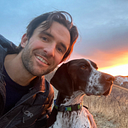Member-only story
The ‘20–3–5’ Nature Rule Prescribes Exactly How Much Time You Should Spend in Nature
Use it to reduce stress and anxiety, tame burnout, and get some of the benefits of meditation
The herd of massively-antlered, 400-pound caribou was running 50 miles an hour and directly at me. The 30 animals had been eating lichen on the Arctic tundra, more than 100 miles from any settlements in Kotzebue, Alaska, when something spooked them. I was apparently sitting in their escape route.
I was in the Arctic for more than a month on a backcountry hunt while reporting my new book, The Comfort Crisis, which investigates the shocking downsides of our overly comfortable (first) world and reveals how we can leverage the power of a handful of evolutionary discomforts that will dramatically improve our fitness, health, and happiness. The Arctic is one of many places around the world I embedded myself in while investigating the upsides of getting out of our comfort zones.
The ground began to vibrate once they cracked 100 yards. At 50 yards I could see their hooves smashing the ground and kicking up moss and moisture. Then they were at 40, then 35 yards.
I could hear their breathing, smell their coats, and see all the details of their ornate antlers. Just as I was wondering…
